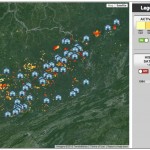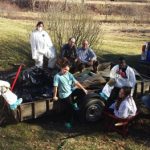 Two species of crayfish native to Appalachia are in danger of becoming extinct after years of suffering habitat loss and water quality impacts attributable to mountaintop removal coal mining and other industrial activity. The U.S. Fish and Wildlife Service agency is proposing the species be listed as endangered under federal law. Whether or not they are pushed past the point of no return depends largely on the outcome of a recent proposal by the agency to add them to the federal list of endangered species.
Two species of crayfish native to Appalachia are in danger of becoming extinct after years of suffering habitat loss and water quality impacts attributable to mountaintop removal coal mining and other industrial activity. The U.S. Fish and Wildlife Service agency is proposing the species be listed as endangered under federal law. Whether or not they are pushed past the point of no return depends largely on the outcome of a recent proposal by the agency to add them to the federal list of endangered species.
Blog Archives
Appalachian Crayfish: Canaries in a Coal Mine
Appalachian communities at growing risk from mountaintop removal
 Appalachian Voices is committed to creating a forum for citizens’ stories and sharing the most up-to-date data available about the ongoing risks the practice poses to Appalachia. Today, we’re sharing a new web tool we developed to reveal how mining continues to encroach on communities and send a resounding message that ending mountaintop removal is a must if we hope to foster economic and environmental health in Appalachia.
Appalachian Voices is committed to creating a forum for citizens’ stories and sharing the most up-to-date data available about the ongoing risks the practice poses to Appalachia. Today, we’re sharing a new web tool we developed to reveal how mining continues to encroach on communities and send a resounding message that ending mountaintop removal is a must if we hope to foster economic and environmental health in Appalachia.
Regional Report Details Victories, Challenges Over Poverty
A report released in February by the Appalachian Regional Commission, Appalachia Then and Now: Examining Changes to the Appalachian Region Since 1965, examines the impact of improved infrastructure, education and job opportunities across the region. According to the report, Appalachia’s poverty rate dropped from 31 percent to 16.6 percent over the last five decades.
The will against poverty: ASU students serve in rural Appalachia

Jan. 19 marked the twentieth year since President Clinton passed legislation to encourage Americans to volunteer on Martin Luther King Jr. Day. Appalachian State University has recognized the day the with the MLK Challenge for sixteen years. Having participated in the challenge as a student, I couldn’t help but want to participate again. But I never knew I would be spelunking in a dusty crawlspace.
Obama budget creates opportunities for Appalachian communities
 The Obama administration’s 2016 budget calls for hundreds of millions of dollars in federal funds to be spent cleaning up abandoned strip mines, and to support economic development and workforce training in mining communities facing layoffs as coal is increasingly outcompeted in America’s energy mix. Read a statement from Appalachian Voices Legislative Associate Thom Kay on the proposals.
The Obama administration’s 2016 budget calls for hundreds of millions of dollars in federal funds to be spent cleaning up abandoned strip mines, and to support economic development and workforce training in mining communities facing layoffs as coal is increasingly outcompeted in America’s energy mix. Read a statement from Appalachian Voices Legislative Associate Thom Kay on the proposals.
An interview with Christopher Scotton, author of “Secret Wisdom of the Earth”
 From The Appalachian Voice Online: “Secret Wisdom of the Earth,” the debut novel by Christopher Scotton released this week, is a coming-of-age story that takes familiar themes — tragedy and the quest to find healing — and explores them with the backdrop of a Central Appalachian community beset by mountaintop removal coal mining.
From The Appalachian Voice Online: “Secret Wisdom of the Earth,” the debut novel by Christopher Scotton released this week, is a coming-of-age story that takes familiar themes — tragedy and the quest to find healing — and explores them with the backdrop of a Central Appalachian community beset by mountaintop removal coal mining.
Fighting Mountaintop Removal During the Obama Years

 From The Appalachian Voice: In 2009, representatives of the new Obama administration said that “the administration will do what the science calls for.” In Appalachia, the science calls for an end to mountaintop removal coal mining. But six years later, mountaintop removal is still happening.
From The Appalachian Voice: In 2009, representatives of the new Obama administration said that “the administration will do what the science calls for.” In Appalachia, the science calls for an end to mountaintop removal coal mining. But six years later, mountaintop removal is still happening.
Appalachia’s Health Checkup

For decades, residents of Appalachia have struggled with poor health and disproportionate rates of chronic disease. In the face of these challenges, efforts to bring medical care to those in need and foster healthier communities are growing.
What will Obama’s legacy be on mountaintop removal?
 After six years of the Obama presidency, mountaintop removal coal mining continues to put Appalachian communities at risk, leading many to wonder what his legacy on the issue will be. The Alliance for Appalachia just released a Grassroots Progress Report examining the administration’s successes and shortfalls in dealing with mountaintop removal.
After six years of the Obama presidency, mountaintop removal coal mining continues to put Appalachian communities at risk, leading many to wonder what his legacy on the issue will be. The Alliance for Appalachia just released a Grassroots Progress Report examining the administration’s successes and shortfalls in dealing with mountaintop removal.
From Southwest Virginia, a path for less pollution
 Kathy Selvage comes from a long line of coal miners in southwest Virginia. She’s proud of her heritage, yet is a passionate advocate for moving Appalachia away from fossil fuels and toward clean energy.
Kathy Selvage comes from a long line of coal miners in southwest Virginia. She’s proud of her heritage, yet is a passionate advocate for moving Appalachia away from fossil fuels and toward clean energy.

